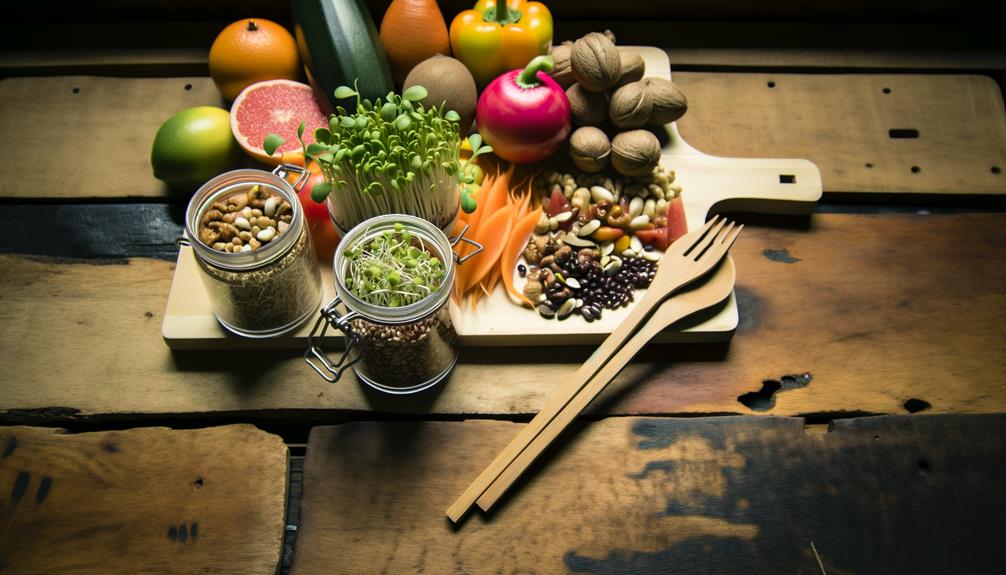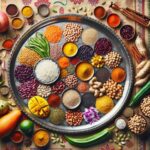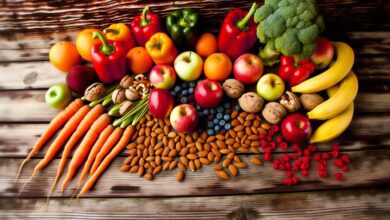As you stand at the crossroads of culinary tradition and environmental stewardship, consider this: a raw food lifestyle isn’t just about what you eat—it’s how you honor the earth that provides. Embracing a plant-based diet rooted in rawness, you’re already making waves in conservation and health, but there’s always room to refine your impact. Start by syncing your food choices with the rhythm of local harvests, ensuring that you’re not only getting the freshest produce but also cutting down on transport emissions. Remember to strip back on packaging, opting for bulk buys with your own containers to reduce plastic waste. And don’t forget that your kitchen scraps have a second life—composting transforms them from trash to treasure, nourishing the soil for future growth. As you navigate these sustainable practices, you’ll conserve water and support brands that align with your eco-conscious values. Yet, the journey doesn’t end here; there’s a seasonal map to follow, one that guides you through the natural ebbs and flows of food availability. Stay with us as we unveil the subtler shades of green in your raw food palette, where each bite is a step towards a more sustainable planet.
Key Takeaways
- Optimize local produce consumption by shopping at farmers’ markets and joining CSA programs to support sustainable food practices.
- Reduce packaging waste by buying raw foods in bulk and using reusable containers, promoting eco-friendly practices.
- Compost organic scraps to nourish the soil and cycle nutrients back into the ecosystem, conserving water resources.
- Embrace seasonal eating to reduce carbon footprint, support local farmers, and promote biodiversity, contributing to a culture of care.
Optimize Local Produce Consumption
Dive into the bounty of your community by shopping at local farmers’ markets, where you’ll shrink your carbon footprint and relish the freshest produce seasonally available. By selecting from the vibrant array of local fruits and vegetables, you’re not just nurturing your body with the health benefits of a raw food diet; you’re also extending a caring hand to the earth and your local farmers.
Embracing a raw vegan diet with local produce isn’t only about enjoying the crisp, pure flavors; it’s a commitment to a sustainable lifestyle that values the well-being of your community. Eating raw foods reduces the risk of foodborne illness, as shorter supply chains mean fewer chances for contamination. Plus, the natural weight loss properties of raw fruits and vegetables can flourish without the shadow of preservatives.
To further deepen your impact, consider joining a CSA program. You’ll receive a regular share of the harvest, directly connecting you to the rhythm of the land. Or, roll up your sleeves in a community garden, where the soil and camaraderie are equally nourishing. And remember, techniques like canning and fermenting allow you to savor the local abundance even when the fields are at rest.
Reduce Packaging Waste
By choosing to buy raw foods in bulk and using reusable containers, you’re taking a significant step towards reducing the environmental impact of packaging waste. Adopting a raw food lifestyle is not just about the personal health benefits of an eating plan composed of raw and unprocessed foods; it’s also about embracing a more sustainable way of life.
When you commit to a vegetarian or vegan diet, rich in whole grains and legumes, fruits and vegetables, you naturally minimize processed foods and the accompanying packaging. Sustainable tips for this journey include shopping at local markets and farms where you can find fresh, unpackaged produce. Engaging with your community in this way not only supports local agriculture but also fosters a culture of mindfulness and stewardship.
Moreover, by creating your own raw food staples, such as sprouting seeds at home or making nut milk, you contribute to a circular economy. And let’s not forget the importance of composting. Your food scraps, along with any biodegradable packaging, can return to the earth, nourishing it rather than cluttering it.
In these actions, you serve not only your own well-being but also the health of our planet. Every choice to reduce packaging waste is a step towards a more sustainable and compassionate world.
Compost Organic Scraps
Transform your kitchen scraps into garden gold by starting a compost bin, an earth-friendly step that nourishes the soil and cycles nutrients back into the ecosystem. Embracing a raw food lifestyle isn’t just about the vibrant fruits and vegetables you consume; it’s also about adhering to sustainable tips that reduce waste. Composting organic scraps is a cornerstone of this.
When you compost, you’re participating in environmentally friendly practices that honor the earth. Here’s how you can turn your food waste into a source of life for your garden:
| Do Compost | Don’t Compost |
|---|---|
| Fruit and vegetable peels | Oily foods |
| Coffee grounds and eggshells | Diseased plant materials |
| Organic yard waste | Inorganic materials like plastic |
| Tea bags (non-plastic) | Animal waste |
Conserve Water Resources
Just as composting turns your kitchen scraps into a sustainable resource for your garden, conserving water is equally essential in maintaining an eco-friendly raw food lifestyle. Each drop of water you save supports the health of our planet, which, in turn, nurtures your raw food diet. Conserving water resources is more than just an action; it’s a tribute to the purity and simplicity of the foods you eat.
Imagine the sound of a gentle rain being captured to water your vibrant vegetable patch, or the quiet drip of a repaired faucet conserving countless gallons. You’re not just eating raw; you’re living in harmony with Earth’s cycles. Here are a few impactful ways to conserve water:
- Install a water-efficient drip system for your lush, homegrown sprouts and leafy greens.
- Embrace the full load principle; run your dishwasher or laundry machine only when they’re filled to the brim.
- Fix leaks promptly; a single dripping tap can waste a shocking amount of water over time – water that could hydrate your body and nourish your raw diet.
Your raw food lifestyle thrives when you conserve water resources, ensuring that every aspect of your health and diets reflects a deep respect for the natural world.
Support Eco-Friendly Brands
As you journey deeper into a raw food lifestyle, choosing products from eco-friendly brands can significantly amplify your positive impact on the planet. When you support eco-friendly brands, you’re not just nurturing your body with a raw food diet that’s low in calories and high in fiber; you’re also nurturing the Earth. A raw food lifestyle involves eating mostly raw, which pairs beautifully with environmentally friendly practices.
Look for brands committed to ethical sourcing and reducing carbon footprints. Your choices help create a demand for organic products and support for raw veganism, which values the health of both individuals and the environment.
Here’s a quick guide to help you choose wisely:
| Eco-Friendly Aspect | Why It Matters | What to Look For |
|---|---|---|
| Sustainable Packaging | Reduces waste | Recyclable or compostable materials |
| Ethical Sourcing | Ensures fair practices | Fair trade certifications |
| Carbon Footprint | Lowers environmental impact | Brands with carbon offset initiatives |
Embrace Seasonal Eating
Diving into the rhythm of the seasons, you’ll discover that embracing seasonal eating not only brings a variety of flavors to your table but also significantly lessens your ecological footprint. By choosing fruits and vegetables that are in their peak season, you’re tapping into the freshest produce that’s high in fiber, packed with natural enzymes, and bursting with vibrant life that a raw food diet celebrates.
In your journey towards a raw food lifestyle that is both sustainable and nurturing, consider these vivid images:
- *Baskets brimming with sun-kissed berries and crisp greens from your local farmer’s market.*
- *The earthy smell of just-picked herbs that infuse your meals with aromatic delight.*
- *The colorful mosaic of freshly harvested vegetables that turn your plate into a work of art.*
These snapshots aren’t just pleasing to the senses; they’re sustainable tips that guide you towards a diet that’s mostly raw, teeming with nutrients, and gentle on the planet. Whether you’re preparing a dish that’s entirely raw or complementing your meals with raw and cooked elements, seasonal eating ensures a low calorie intake without sacrificing satisfaction. By serving yourself and others with this mindful approach, you’re contributing to a culture of care that extends beyond the dinner table.
Frequently Asked Questions
What Are the Points We Should Keep in Mind While Eating Raw Food?
Imagine you’re blending a local, organic kale smoothie. Remember to balance nutrition, hydrate well, and combine foods that enhance enzyme activity. Watch for detox symptoms or allergic reactions, and invest in quality kitchen equipment.
How Do You Live on Raw Food?
You’ll thrive on raw essentials by focusing on nutritional balance, selecting seasonal, organic produce, and preserving enzymes. Stay hydrated, master food combining, detox regularly, and use creative recipes with your kitchen equipment.
What Are the Rules for the Raw Food Diet?
You’ll focus on enzyme preservation and nutrient retention by eating uncooked essentials. Adhere to a temperature threshold for food hygiene, embrace ingredient variety, and prefer organic, seasonally sourced foods with sprouting techniques.
How Do You Succeed on a Raw Food Diet?
To succeed on a diet, focus on nutrient density and hydration. Use creative recipes and sprouting techniques. Meal planning with seasonal produce and proper food combining aids digestion. Seek kitchen tools and community support.







